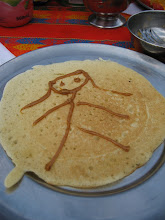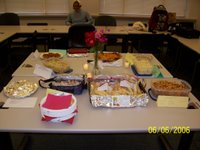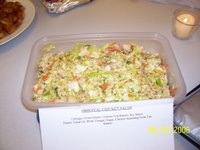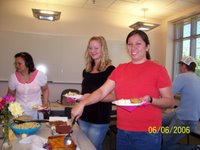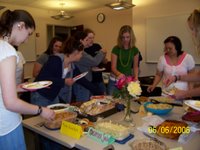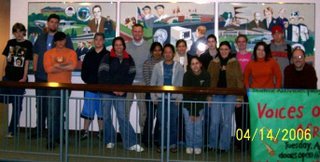Wednesday, June 07, 2006
Friday, April 14, 2006
Monday, March 13, 2006
How to Make Scallion Pancakes

Making scallion pancakes can be quite straightforward when you get two excellent chefs in the kitchen. I had my dad and our family friend, Uncle Kuo, help me out. So I got to just sit back and watch the magic....
The ingredients needed are simple: flour, water, scallions, oil, and salt.
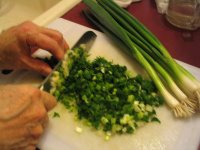 To get started, mix 3 cups flour with 1 cup hot water. Once that's mixed, add in 1/3 cup cold water and mix until even. Knead on a lightly floured surface until you have a nice, smooth ball o' dough. Let the dough rest for about 30 minutes. You can chop the scallions into about 1/8" pieces while you wait. Next, take the dough and form a log about 2-3 inches in diameter. Cut the log into 6-8 equal pieces. Take one piece of the dough, rounding and then flattening it on a lightly floured surface. With a rolling pin, roll the dough out until it is about 1/16" thick. Don't worry if it's not especially round. Then put about 1 tsp of oil on top, spreading it evenly all over the surface. Sprinkle a layer of salt on top and then a layer of chopped scallions. Now, the next part is a bit tricky if you've never seen it done before. Roll up the pancake, with the scallion side on the inside.
To get started, mix 3 cups flour with 1 cup hot water. Once that's mixed, add in 1/3 cup cold water and mix until even. Knead on a lightly floured surface until you have a nice, smooth ball o' dough. Let the dough rest for about 30 minutes. You can chop the scallions into about 1/8" pieces while you wait. Next, take the dough and form a log about 2-3 inches in diameter. Cut the log into 6-8 equal pieces. Take one piece of the dough, rounding and then flattening it on a lightly floured surface. With a rolling pin, roll the dough out until it is about 1/16" thick. Don't worry if it's not especially round. Then put about 1 tsp of oil on top, spreading it evenly all over the surface. Sprinkle a layer of salt on top and then a layer of chopped scallions. Now, the next part is a bit tricky if you've never seen it done before. Roll up the pancake, with the scallion side on the inside.
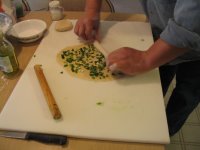 Once you've rolled up the pancake, take one end of the roll and wrap it around the other, so it makes a circle, similar to a cinnamon roll. Tuck the end under so it doesn't unravel. Repeat the process until you have all your scallion pancakes done. Then put a piece of saran wrap over them and let it rest for about 30 minutes. This is so the oil can absorb into the dough more.
Once you've rolled up the pancake, take one end of the roll and wrap it around the other, so it makes a circle, similar to a cinnamon roll. Tuck the end under so it doesn't unravel. Repeat the process until you have all your scallion pancakes done. Then put a piece of saran wrap over them and let it rest for about 30 minutes. This is so the oil can absorb into the dough more.
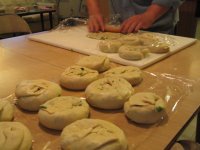 After you've let the pancakes sit, it's time to roll them out. Take one of the rolls and flatten it out with your palm first. Then, making sure to keep it round, roll out each pancake roll until it's about 1/8" thick. Put about a tablespoon of oil in a flat bottomed frying pan on medium high heat and pan fry until the sides are crispy and golden. Take out and cut into wedges.
After you've let the pancakes sit, it's time to roll them out. Take one of the rolls and flatten it out with your palm first. Then, making sure to keep it round, roll out each pancake roll until it's about 1/8" thick. Put about a tablespoon of oil in a flat bottomed frying pan on medium high heat and pan fry until the sides are crispy and golden. Take out and cut into wedges.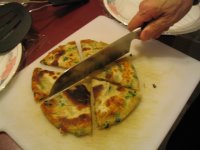
This dish is delicious served on its own with a nice soup. It can also be used like a tortilla. In Taiwan, they put roast beef slices inside, roll it up, and slice it for a hearty lunch. It can also be added to a sautee of nappa cabbage with pork or beef strips. Cut the wedges thin for this. All in all, it was one of my favorite after school snacks growing up and I'm thankful for the chance to see it made again!
Sunday, March 05, 2006
Food, Glorious Food
As a class, we've been reading "Fast Food Nation," by Eric Schlosser. This expose of the fast food industry has fueled many exciting discussions about the huge impact and implications fast food has had on our own personal lives, our society, and the world.
The last few blogs of this quarter will all center around the role of food in our lives. Blog 6 covers our own thoughts on the place of food in our lives. Be it an excuse for gathering or a vehicle of culture/history or simply something to "refuel" ourselves, everybody eats and you'll see our musings on our own personal relationships with food.
Our last blog of the quarter, Blog 7, will be a collective protest against the fast foods of the world. We will be posting recipes for slow foods, foods made from scratch by human hands and eaten and enjoyed at the table together, that are significant to our families or cultures. Although sometimes it feels that the pressures of time, the overwhelming presence of McDonaldization everywhere as well as economics all cage us in and make us helpless, we can do something. As Malcolm Gladwell points out again and again in his book "The Tipping Point," little things can make a big difference. So we eat in solidarity as our protest. Join us.
Sunday, February 12, 2006
They really should have a thingamabob that does this!
How do inventors come up with their ideas? Is it a lack of something and genius strikes in a moment of pure frustration? Or do certain people sit and observe and plot to come up with a object or service that will take over and occupy a permanent spot in our lives?
The inventor of Velcro, Swiss outdoor enthusiast George de Mestral, was out walking his dog and upon coming home, discovered he was covered with burs. His Aha! moment came as he took those little sticky burs off the dog's fur. Though met with initial scorn and derision, velcro has obviously come to stay.
So what do you have cooking in the back of your minds? What object or service do you think would take off and make you rich and famous? When it does, don't forget it all started here in the convergenzone and mail your poor ol' English teacher one of those royalty checks.
Roses are Red, Violets are Blue
Everyone's a poet
Even if they don't know it
("Stop rhyming, I mean it!"
"Would anyone like a peanut?")
Kudos to you if you get the allusion.
Music and poetry, the refuge of the busy. Blog #4 has us putting our favorite song or poem online and applying a critical eye to them. Using "The Method" of analysis from class, we looked at our text with an eye for repetitions, strands, and binaries. Picking the most significant of those, we wrote a bit on what the poem/song might be saying and what it says to us. Enjoy our collective jukebox.
Tuesday, January 24, 2006
Releasing our Inner Critics
Book Review on The Samurai’s Garden by Gail Tsukiyama
I was all prepared to love The Samurai’s Garden because Gail Tsukiyama had come to our college in the Spring of 2005 and I found her to be a lovely person. Down-to-earth and articulate, she talked about her writing process for creating this book as well as her other best seller Women of the Silk. Other instructor I knew had used the book in their classes and thus, it was with the highest of expectations that I begin the book.
The Samurai’s Garden takes place during World War II, after the rape of Nanking and while Japanese forces were marching in to take over China. The main character, Stephen, the son of a wealthy Chinese businessman working in Japan, has contracted tuberculosis and has been sent to his family’s seaside cottage. There in Tarumi, as his body recuperates from the disease, he is befriended by Matsu, the reticent and pragmatic caretaker of his father’s estate. Through him, Stephen meets Sachi, a beautiful woman whose life has been marred by disease and now lives in a leper colony. Both Matsu and Sachi teach Stephen about the dignity and beauty that can be found in a life which is interrupted, yet perseveres. In the meanwhile, he has his own romance with a local girl, Keiko, whose brother serves in the Japanese Imperial Garden. At the end of the story, Stephen leaves Tarumi stronger in both body and soul, and wiser.
Although the story had so many potentially rich and interesting characters and plot possibilities, overall I found the story to be contrived and the characters flat. The Samurai’s Garden feels dreamlike in many ways because Stephen leaves his everyday life for this sleepy seaside hamlet. But the situations and people he encounters and the ways that he reacts to them does not ring true for me. For instance, the love triangle involving Sachi and Matsu seemed to contradict itself by the ending. Also, Stephen’s relationship with Keiko doesn’t get developed clearly and the difficulty for her in getting to know a Chinese man in the midst of a war with China is never fleshed out. I finished the book feeling somewhat dissatisfied and vaguely disturbed by the descriptions of Keiko as having the “scent of jasmine” floating around her. There’s just a bit too much exotica there for me.
Would I recommend this book? Yes, but with some reservations. The Samurai’s Garden definitely gave me insight into a group of people that I never knew existed, but it didn’t make me care much about them.
Here are some other reviews of The Samurai's Garden. http://www.amazon.com/gp/product/product-description/0312144075/ref=dp_proddesc_0/104-1691088-2669556?%5Fencoding=UTF8&n=283155
The first one is written by Nancy Perl, the famed Seattle librarian with her own action figure doll. She's probably the one I agree the most with. Other reveiwers really enjoyed Tsukiyama's lyrical style, which I also agree with. I did, after all, finish the book.
Monday, January 16, 2006
Blind date
Show not tell version:
He came into Tully's a little red-faced from the cold. Looking around at the mostly empty coffee shop, his glance fell upon a dark haired woman dressed in a navy blue dress sitting next to the fireplace that is perpetually burning in Tully's. "Are you Chrissy?" he asked. When she replied yes, he stuck out his hand and shook hers vigorously. Then he sat down. She had been drinking a cup of coffee which she put down. He immediately proceeded to ask her how her day had been. They touched upon work, interests, trying to find some common ground. After about ten minutes, he asked her, "So, are you a sweet, fatty type of person or a fried salty person?"
She laughed, looking at him with her head slightly tilted, one eyebrow slightly arched. "What?" she asked.
"Sweet fatty people are the type who can't resist cake, donuts, ice cream and such. Fried salty are people who like chips and things like that.
Chrissy laughed again. "Oh, definitely fried salty. I can't resist a bag of chips. I'll buy them at the grocery store and they'll be half gone by the end of the night."
"I'm a sweet fatty," he confessed. "I love bread and cinnamon rolls and things like that." She smiled, amused, and leaned in a bit closer. The cup of coffee sat untouched in the middle of the table as the conversation continued.
-------------------------------------------------------------------------------------
Show not tell plus analysis
I was sitting at a little round table with cafe latte when he came in--tall, a little red-faced from the cold, around thirty something in a beige knitted sweater. He looked around and then walked over to a dark haired lady at the loveseat next to the fireplace they're got perpetually burning in Tully's. After asking her name, he took a seat next to her and introduced himself. "Ooh, a blind date," I thought to myself. For the next ten minutes, they proceeded to chitchat about work and such, so I turned my attention back to my papers. "So are you a sweet, fatty type of person or a fried, salty?" he asked. My ears perked up. I've never heard anyone separate snacks into these two categories. And to ask a person on a blind date seemed somewhat daring--a little on the personal side. "Sweet fatty people are the type who can't resist cake, donuts, ice cream and such. Fried salty are people who like chips and things like that." The dark haired woman laughed.
"Oh, definitely fried salty," she replied. "I can't resist a bag of chips. I'll buy them at the grocery store and they'll be half gone by the end of the night."
"I'm a sweet, fatty," he said. "I love bread and cinnamon buns and things like that."
It made sense. Snacking preferences or weaknesses could generally be broken into these broad groups. Their admission of their weakness for a certain type of snack broke the ice for them. The conversation turned again, so I went back to my work. When I left half an hour later, they were still laughing and talking, her cup of coffee cold on the table in between them.
Sanctioned Eavesdropping
Sometimes when I watch a movie, I'll be struck by a line or comment that is made which reverberates as absolutely true with me. Back in the 90s, a movie called "The Paper" starred Michael Keaton as a newsreporter who is a classic workaholic, driven by the adrenaline of getting the perfect story before the paper goes to press. He and his wife Marisa Tomei, who is equally driven, are expecting the birth of their first child at any time. She has been given time off though and there's a slight rift between them because she no longer has the same kind of pressure from deadlines. One evening, Keaton's character is supposed to join his wife and her parents for a long-delayed dinner. He promises to be there but a lead on a story comes in and he ends up missing the dinner. Later that night they have an argument and Marisa's charcter gives him a scenario:
Marisa: Suppose there was a terrorist. And he had a gun to my head and he told you to choose. The paper or me. What would you do?
Michael: Don't be ridiculous. Of course I'd choose you. But that would never happen.
Marisa: Exactly. We never have to make big choices like that. It's the little choices that we make every day that make a difference.
Of course this is all an approximation of what was said and my memory isn't so hot, but I remember being struck by the absolute truth of it. So this week, that's what we'll be doing--noticing the conversations that go around us and seeing what is interesting, strange, revealing, or even profound.
